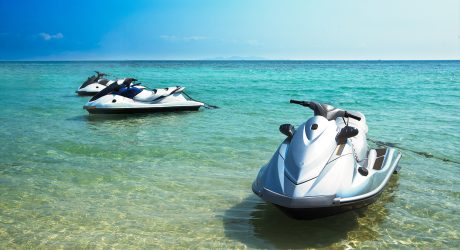In January 2023, the Department of Transport announced plans to introduce new legislation to close the legislative gap on the dangerous misuse of watercraft such as jet skis in the UK. The proposed legislation, set to come into force on 31 March 2023, would grant the Maritime and Coastguard Agency more powers to prosecute perpetrators of accidents.
In this article, International Injury associates James Griffin and Rebecca Huxford consider the growing popularity of jet skis, the most common safety risks and the laws regulating their use in the UK and overseas.
History of the jet ski
The term jet ski is actually a generic trademark for a personal watercraft, much like the brands ‘Hoover’ or ‘Velcro’. The pandemic supercharged the industry’s growth, with the use and ownership of jet skis in the UK rising significantly as people were unable to travel abroad. Jet skis can now be seen off the coast of most beaches around the UK and at every holiday resort around the world. There are an estimated 12,000-15,000 personal watercraft in use in the UK.
Jet skis can come in either ‘sit down’ or ‘stand up’ varieties, dictating the user’s position while operating the vehicle. The ‘sit down’ version is more commonplace and more usually available for rent at holiday beach resorts. Jet ski engines can be very powerful – a typical jet ski available for hire will likely have a top speed from 40-70 mph.
Existing regulation of jet skis in the UK
Despite many jet skis boasting a top speed similar to the legal limit on a British motorway, legal regulation of their use in the UK has historically been limited. In the UK:
- You do not require a driving licence or any formal training to be legally allowed to operate a jet ski for recreational use.
- You only require a licence if you intend to use the jet ski in a professional racing environment.
- There is no minimum age limit on operating a jet ski, although many rental companies place their own bar on renting a jet ski to anyone under the age of 16.
- There is no legal requirement to have a jet ski insured.
The lack of regulation in the UK also means there is no legal requirement for jet ski users to wear appropriate safety clothing such as a wetsuit or dry suit, a life vest, a helmet, footwear or leg guards.
The International Regulations for the Prevention of Collisions at Sea (COLREGs) provide a maritime equivalent of the ‘rules of the road’ for safe use of vessels at sea. These include general rules on keeping a lookout, safe speeds and when to give way to other vehicles and vessels on the water.
However, the judge in the criminal case of R v Goodwin [2005] EWCA Crim 3184 ruled that, for the purposes of criminal prosecution, the COLREGs as adopted into UK legislation did not apply to jet skis as they could not be defined as a ‘vessel’. This ruling left a loophole in UK criminal legislation which successive governments had contemplated filling, but failed to take action on until now.
New jet ski legislation
The government’s proposed laws would mean that those found guilty of using watercraft in a dangerous manner could receive an unlimited fine and/or up to two years in prison.
This legislation clearly acknowledges that more needs to be done to protect the victims of accidents involving watercraft, and bring those who misuse personal watercraft to justice. The legislation does not, however, include a mandate for jet ski owners to hold appropriate insurance coverage for accidents which cause personal injury to themselves or others. It also does not provide for a statutory scheme to compensate victims who are injured by people who do not take out compulsory insurance, akin to the Motor Insurers’ Bureau that covers road traffic accidents involving uninsured motor vehicles and untraced drivers.
If the legislation does not make provision for compulsory insurance, it may fail to protect future victims of watercraft accidents and prevent them the right of securing appropriate compensation for their injuries.
Regulation of jet skis abroad
If you have used a jet ski in the past, you may have done so when on holiday overseas.
If you suffer an accident whilst using a jet ski abroad, your ability to bring a claim for compensation in the courts of England and Wales may depend on:
- How and where you rented the jet ski;
- The circumstances of your jet ski use (including whether your use was included as part of a package holiday or an excursion booked with your tour operator);
- Which individual or company is potentially responsible for the accident and where they are based; and
- Where your accident took place.
If you are able to pursue the claim in England and Wales, the courts would take into account the prevailing local standards and laws of the country in which your accident occurred. These standards may vary from country to country, and may not be lower standards than those operating in the UK.
In Spain for example, all jet ski engines must be less than 55cc horsepower and fitted with a remote control cut-out. All users must also receive instructions on how to operate the jet ski. In addition, no jet ski must come nearer than 200 metres to the coastline except in specially marked zones. In Greece, jet skis cannot be hired by anyone under 18 and a driver’s licence and registration is required.
If you are thinking about renting a jet ski when on holiday abroad, you may want to consider the following:
- Does the jet ski rental company have insurance, or can you take out your own additional insurance to cover the jet ski rental?
- Will your travel insurer provide cover for medical bills in the event that you are injured using a jet ski and need emergency treatment?
- Does your travel insurance provide cover if you need to make a claim against another individual or for defending a claim against you arising from use of a jet ski?
Risk of jet ski injury
As with any motorised vehicle, operating a jet ski comes with an inherent risk of injury whether that be damage caused directly by the jet ski or riders being thrown into the water and colliding with other objects or people.
Statistics from the US Coast Guard suggest an average of 40-50 deaths and 600-700 non-fatal injuries resulting from jet ski accidents in the USA each year. There are no comparable statistics around use of private jet skis in the UK or the severity of related injuries, which reflects the lack of regulation currently.
However, there have been a number of deaths reported in the media involving both experienced and less experienced riders. Beki Hellens, a proficient jet ski rider, died after suffering significant blood loss when her main artery was torn from her heart following a collision with another rider. Police officer and RNLI crew member Barry Davies died in 2020 when he fell from a jet ski.
Injuries can range from minor bruising, friction burns and whiplash to serious and life changing traumatic brain injury, spinal cord injury and amputation. There have been reports overseas of passengers sustaining acute tearing injuries to the genital, abdominal and pelvic areas as a result of falling off the back of a jet ski and landing into the high-pressure water jet stream. In two reported cases, these injuries have caused holes in the bowel wall requiring treatment with a colostomy bag and serious psychological trauma.
Concluding thoughts: is current jet ski regulation enough?
The causes of jet ski accidents vary, but the most common factors are usually age, inexperience, speed, reckless behaviour (including consumption of alcohol and drugs), loss of control and inadequate safety equipment and training.
Although tighter criminal regulation is welcome, it is questionable whether the legal regime governing jet ski use is enough in the UK or abroad. Further legislation that imposes licensing and minimum standards for training and assessing jet ski operators, with consideration given to speed, weather conditions and other maritime safety regulations, may help reduce incidents that result in serious injury. Designated jet ski zones could also help to protect vulnerable water users. Mandatory requirements for life jackets, gloves and padded headgear could help reduce the severity of any injuries suffered.
It seems clear that there remains plenty of scope for the introduction of further safety measures to prevent further tragic incidents on the water.
You can find further information regarding our expertise, experience and team on our International Injury pages.
If you require assistance from our team, please contact us.
Subscribe – In order to receive our news straight to your inbox, subscribe here. Our newsletters are sent no more than once a month.






